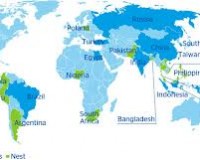
China Minsheng Banking Corp. (1988) plunged the most since October 2011 in Hong Kong, while Brilliance China Automotive Holdings Ltd. (1114) dropped 11 percent as profit missed analysts’ estimates. OAO Gazprom, Russia’s gas export monopoly, declined the most in six weeks.
Brazil’s Bovespa index posted its worst start to a year since 1995 as billionaire Eike Batista’s companies slumped, leading a tumble in commodity producers.
The MSCI Emerging Markets Index rose 0.1 percent to 1,032.62 in New York, paring its quarterly decline to 2.1 percent. China’s regulator told lenders today to limit investments of client funds in credit assets that aren’t publicly traded. Separately, the State Council said yesterday that it will take steps this year to loosen state control over interest rates and the yuan in a bid to sustain growth.
“It’s a potential headwind,” said Walter ‘Bucky’ Hellwig, who helps manage $17 billion of assets at BB&T Wealth Management in Birmingham, Alabama. He spoke in a phone interview. “Any disappointment or anticipation of a slowdown of growth in China is certainly unwelcome in the emerging markets.”
Gains in the U.S. market helped lift emerging stocks today as the Standard & Poor’s 500 Index rose to a record. Cyprus lenders opened for the first time in almost two weeks, with new rules curbing access to cash preventing an initial panic to withdraw deposits.
Commodity Shares
Energy shares in MSCI Emerging Markets Index dropped the most among 10 groups. The broader gauge has slipped 2.1 percent this year, trailing a 7.2 percent gain in the MSCI World Index of developed-country stocks. The emerging-markets measure trades at 10.9 times 12-month projected profit, compared with the MSCI World’s 14.2, according to data compiled by Bloomberg.
The iShares MSCI Emerging Markets exchange-traded fund rose 0.2 percent to $42.77. The Chicago Board Options Exchange Emerging Markets ETF Volatility Index, a measure of options prices on the fund and expectations of price swings, rose 0.5 percent to 16.72.
Brazil’s Bovespa rose 0.6 percent as Centrais Eletricas Brasileiras SA, Brazil’s biggest power utility by sales, surged the most in four months after announcing dividend payments and a plan to return to profitability. The shares jumped 16 percent, the biggest gain in the emerging-market gauge.
Biggest Losses
The Bovespa dropped about 7.5 percent from January through March, the biggest first-quarter drop since a 32 percent plunge at the beginning of 1995. Batista’s iron-ore producer MMX Mineracao & Metalicos SA and oil company OGX Petroleo & Gas Participacoes SA were the biggest losers, falling more than 47 percent.
Russian shares rose for a second day, sending the Micex Index up 0.6 percent. VTB Group, Russia’s second-largest lender, climbed 3.2 percent after Kommersant reported its management will propose paying 15 percent of net income as dividends for 2012. Gazprom (GAZP) slumped 2.2 percent. The state-run company said late yesterday that 2012 net income dropped 37 percent, based on local accounting standards.
Turkey’s ISE National 100 Index (XU100) rallied 1.3 percent to the highest level since Jan. 24. S&P raised Turkey’s long-term foreign currency credit rating, according to a statement released after the market closed yesterday. Benchmark gauges in Poland and Hungary retreated.
The Shanghai Composite Index (SHCOMP) sank 2.8 percent, the most in three weeks, erasing its gain for the quarter. Hong Kong’s Hang Seng China Enterprises Index lost 1.3 percent. China Minsheng plunged 7.9 percent in Hong Kong. Brilliance China Automotive fell the most since 2011 for the biggest decline in the MSCI Emerging Markets Index. (MXEF)
The extra yield investors demand to own developing-nation dollar debt over U.S. Treasuries fell two basis points, or 0.02 percentage point, to 306, according to the JPMorgan Chase & Co. EMBI Global Index.
Bloomberg


